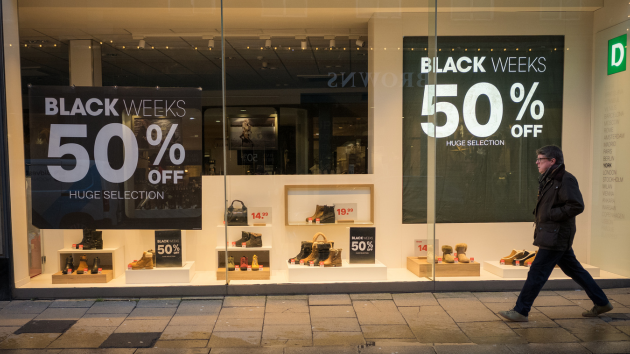Trump says he could impose tariffs without approval from Congress. Is he right?
Written by ABC Audio ALL RIGHTS RESERVED on September 25, 2024
(WASHINGTON) — Former President Donald Trump has raised few policies on the campaign trail more often than tariffs, which he says would rejuvenate manufacturing, create jobs, restrain immigration and help bankroll childcare, among other benefits.
In recent days, he has claimed another advantage of tariffs: They don’t require support from Congress. “I don’t need Congress, but they’ll approve it,” Trump said at a campaign event in Smithton, Pennsylvania, on Monday. “I’ll have the right to impose them myself if they don’t.”
Some economists have said higher tariffs could expand certain areas of U.S. manufacturing, but the policy risks rekindling inflation since importers would likely offset tax payments with higher prices. A potential trade war could hurt U.S. exporters and slow hiring, they said.
However, Trump is largely accurate in his description of the wide latitude enjoyed by the president in setting and implementing some tariffs, experts said. But, they added, Trump’s ambitious tariff agenda could test the limits of that authority, drawing court challenges and opposition from Congress with results that are difficult to predict.
“Will we get a reckoning if Trump gets elected and does what he says he wants to do?” Mary Lovely, a senior fellow at the Peterson Institute for International Economics who studies trade policy, told ABC News. “I think we’ll get one very quickly.”
In response to ABC News’ request for comment, a representative of the Republican National Committee pointed to remarks made by Trump at a campaign event in Georgia on Tuesday.
“The word tariff properly used is a beautiful word,” Trump said. “A lot of bad people didn’t like that word, but now they’re finding out I was right, and we will take in hundreds of billions of dollars into our Treasury and use that money to benefit the American citizens.”
“And it will not cause inflation, by the way. And you know, I took in from China hundreds of billions of dollars in taxes and tariffs, and I had no inflation. We didn’t have any inflation — 1.2% — we had essentially no inflation,” Trump added. (Inflation did not exceed 3% during Trump’s term in office. The pace of price increases fell to near-zero levels early in the COVID-19 pandemic before rebounding to about 1.3% at the end of his term, according to U.S. Bureau of Labor Statistics data.)
On the campaign trail, Trump has promised a sharp escalation of tariffs enacted during his first term. Trump has proposed tariffs of between 60% and 100% on Chinese goods. Envisioning a wide-reaching tariff policy, Trump has also proposed a tax as high as 20% on all imported products.
The Constitution affords Congress the power to “lay and collect Taxes, Duties” as part of its remit to “provide for the common Defence [sic] and general Welfare of the United States.”
That section of the founding document granted Congress control over tariff policy, Inu Manak, a fellow for trade policy at the Council on Foreign Relations, told ABC News. But, in recent decades, the legislative branch has increasingly handed over such power to the executive.
“For more than 80 years, Congress has delegated extensive tariff-setting authority to the President,” the Congressional Research Service, a nonpartisan group made up of congressional staff, wrote in a February report.
During his first term, Trump invoked laws from that period to enact tariffs. Steel and aluminum tariffs drew upon national security powers afforded by a measure signed into law more than 50 years earlier. Trump’s tariffs on Chinese goods depended upon a law from 45 years beforehand, which President Joe Biden invoked in service of tariffs of his own.
“Congress didn’t really push back,” Manak said.
Trump could use similar authority to move ahead with a plan for tariffs between 60% and 100% on Chinese products, experts said. Section 301 of the Trade Act of 1974 allows the executive to gain temporary tariff authority in response to an adverse trade policy taken up by another country. Trump could use the measure to justify tariffs on China in a fashion resembling his first term, Lovely said.
“Probably yes,” Lovely added, though she noted that the time limit on the authority could require Trump to apply for a second round of approval from the Office of the United States Trade Representative, a government agency.
Universal tariffs of up to 20% on all imported goods would likely demand legal mechanisms with little or no precedent, experts said. Trump could declare a national emergency and draw upon the Trading with the Enemy Act, which includes emergency authority to impose tariffs. Then-President Richard Nixon used the law to impose a 10% tariff on all goods over a four-month stretch in 1971.
Trump could avail himself of another lever of power: The International Economic Emergency Powers Act. It allows the president to stop all transactions with a foreign adversary that poses a threat, which could include, in theory, a potential tax on imports, experts said. However, a set of universal tariffs would mark an unprecedented use of the 1977 law.
“All our trading partners pose an unusual, extraordinary threat?” Alan Wolf, a former deputy director-general of the World Trade Organization, said earlier this month in a blog post for the Peterson Institute for International Economics. “That would simply be too large a power grab to have been within what Congress intended in this statute.”
Trump could face court challenges that may reach as high as the Supreme Court, some experts said. The threat of such a move could also draw opposition from Congress, which could seek to repeal or amend the law.
“I don’t know if there would be enough pressure from Congress because as we saw last time, they went along with him,” Manak said.
The lack of close precedent makes it challenging to anticipate how Congress or the courts will act, Lovely said. Opposition could also come from foreign nations that impose retaliatory tariffs, straining some industries and prompting additional pressure on elected officials.
“There’s just a whole lot of uncertainty,” Lovely said.
Copyright © 2024, ABC Audio. All rights reserved.







